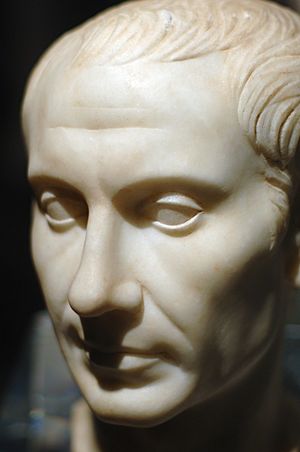Dictator perpetuo facts for kids
Dictator perpetuo (meaning "dictator forever" in English) was a special job title given to Julius Caesar right before he died. He received this title between January 26 and February 15 in the year 44 BCE. Sadly, he was killed on March 15 of the same year.
Normally, a Roman dictator was only in power for a short time, usually six months. But by making Caesar a "dictator forever," it meant he would rule for the rest of his life. This made his power much more like the ancient Roman kings, who ruled for life.
History of Caesar's Dictatorship
Julius Caesar was a very important and powerful leader in ancient Rome. He held the position of dictator a few times before being named "dictator forever."
- In 49 BCE, he was dictator for just eleven days. This was to help with elections or manage important state business.
- He was dictator again for the year 48-47 BCE.
- In 46 BCE, he was chosen to be dictator for ten years. This was already a very long time for a dictator.
- Then, sometime between January and February of 44 BCE, he was given the title of dictator perpetuo, meaning he would be dictator for life.
However, Caesar did not hold this title for long. He was assassinated less than two months later, on March 15, 44 BCE. This day is famously known as the Ides of March.
What "Dictator Forever" Meant
Giving Caesar the title of "dictator forever" was a huge change for Rome. The Roman Republic was supposed to have leaders who were elected and served for limited times. This was to prevent any one person from becoming too powerful, like the kings they had gotten rid of centuries before.
By becoming dictator for life, Caesar gained immense power. He could make laws, control the army, and lead the government without needing to be re-elected or worry about his term ending. This move made many people in Rome worried that he wanted to become a king and end the Roman Republic.
See also
 | Isaac Myers |
 | D. Hamilton Jackson |
 | A. Philip Randolph |


